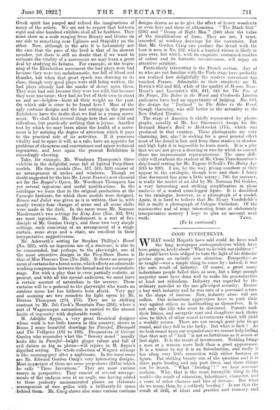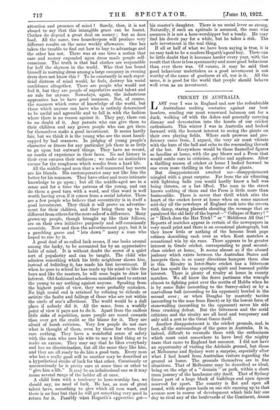GOOD INVESTMENTS.
WHAT •would Hogarth have said• could he have read the long newspaper correspondences which have been going on lately about " What to do with our children ? " He would have been obliged to turn• the light of his didactic genius upon an entirely new situation. Prosperity—so he taught—was a simple thing to come by :.indeed,it was the sure result of industry. Of course, a great many industrious Teeple failed then as now, but a large enough majority must have done well to make his. generalization at least not ridiculous. Industry was regarded by the ordinary moralist as the one gilt-edged security. Endow a boy with industry and he was sure of a perennial return in the •shape of success. Now, industry •alone will -not suffice. Our industrious apprentices have to push their way against others as hardworking •as themselves. It is not only the idle who must be distanced. Parents rack their brains, and energetic sons and daughters rack theirs also, to think of other moral investments which will yield a worldly return. There are not enough good -jobs to go round, and they fall to the lucky. But -what is luck ? As we look round upon our acquaintance we cannot heip,fe,eliag that that sort of luck ' is not so fortuitous. as it seems at first sight. It is the result of investment. Nothing brings a man or a woman more luck than a -good appearance. It is a truism to say it is an introduction, and really it has often very little connexion with either features or figure. Put striking beauty out of the question and it is three parts bearing and one part dress, and these things can be learnt. " What ' bearing' 1 " we hear someone exclaim. Why, that is the most intangible thing in the world—the result •of education, inheritance, character, and a score of other chances and bits of fortune. But what do we mean, then, by a soldierly bearing ? Is not that the result of drill, of effort and practice and memory and attention and presence of mind ? Surely, then, it is not absurd to say that this intangible grace can be learnt. Clothes do depend a great deal on money ; but so does food. All the same, two housekeepers will produce very different results on the same weekly allowance. One has taken the trouble to find out how to buy to advantage and the other has not. There was at one time a notion that care and money expended upon dress made people self- conscious. The truth is that bad clothes are responsible for half the shyness in the world. Who that has found himself in morning-dress ameng-a large company in evening dress does not know this ?' To be constantly in such super- ficial distress of mind would, he feels, destroy his social confidence altogether. There are people who would not feel it, but they are people of superlative social talent and no rule for anyone. Nowadays, again, the industrious apprentice has to have good manners. Not, of course, the manners which come of knowledge of the world, but those which anyone can have who is entirely determined to be useful and agreeable and to fall in with the fashion where there is no reason against it. They pay, there can be no doubt of it. Any parents who can give them to their children and any grown people who can get them for themselves make a good investment. It seems hardly fair, but we think it is the young who are the most handi- capped by bad manners. In judging of young people's character or fitness for any particular job there is so little to go upon but outward things. They have no record, no marks of experience in their faces. No sad history in their eyes excuses their surliness ; we make no instinctive excuse for the roughness which results from a hard life.
All the middle-aged men that a well-mannered boy meets are his friends. His contemporaries may not like him the better for his manners. They have other and more intimate knowledge to go upon ; but all the middle-aged are in a sense and for a time the patrons of the young, and can do them a good turn with a word, and that word is well worth having even if it comes from a social inferior. There are a few people who believe that eccentricity is in itself a good investment. They think it will prove an advertise- ment for their children, and they bring them up to be different from others for the mere sake of a difference. Many grown-up people, though brought up like their fellows, are on their own initiative purposely and self-consciously eccentric. Now and then the advertisement pays, but it is a gambling game and " lets down " many a man who hoped to rise by it. A good deal of so-called luck seems, if one looks around among the lucky, to be accounted for by an appreciative habit of mind. It is without doubt the secret of a quiet sort of popularity and can be taught. The child who admires something which his little neighbour shows him, instead of belittling it, has made his first investment. If when he goes to school he has made up his mind to like the boys and like the masters, he will soon begin to draw his interest. Old-fashioned schoolroom moralists used to entreat the young to say nothing against anyone. Speaking from the highest point of view, they were probably mistaken. No high moral end is attained by refusing to ridicule or satirize the faults and failings of those who are not within the circle of one's affections. The world would be a dull place if nobody did it. All the same, from a worldly point of view it pays not to do it. Apart from the endless little risks of repetition, more people are moral cowards than ever get the credit or the blame for it. They are afraid of harsh . criticism. Very few people do not care what is thought of them, even by those for whom they care nothing. They have a wonderful sense of safety with the man who uses his wits to say a kind thing or to make an excuse. They may say- that he likes everybody and has no discrimination, but all the same they like him, and they are all ready to do him a good turn. Every man who has a really good will to another may be described as a hypothetical stroke of luck for that other. Consciously or unconsciously he is pretty sure at some time or other to " give him a lift." It may be an infinitesimal one or it may mean several rungs of the ladder all at once.
A child born with a tendency to hero-worship has, we should say, no need of luck. He has, as men of great talent have, something to give which all men want, and there is no fear but that he will get something very good in return for it. Possibly what Hogarth's apprentice got— his master's daughter. There is no social lever so strong. Naturally, if such an aptitude is assumed, the man who assumes it is not a hero-worshipper but a toady. He may find his deceit pay for a while, but he takes a risk. The safe investment is the real thing.
If all or half of what we have been saying is true, it is no easy task to be a modern Hogarth's good boy. There can be little doubt that it becomes harder every year, with the result that there is less spontaneity and more good behaviour than ever there was. Of course, it may be said that good behaviour undertaken as a good investment is not worthy of the name of goodness at all, nor is it. All the same, it is good for the world that people should behave well even as an investment.



































 Previous page
Previous page